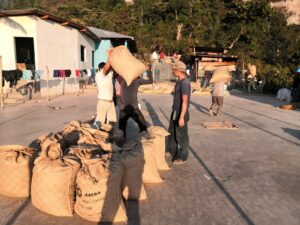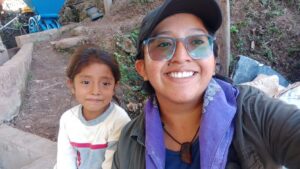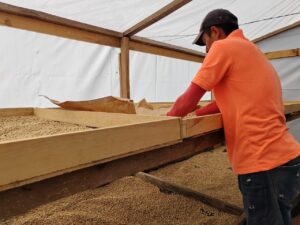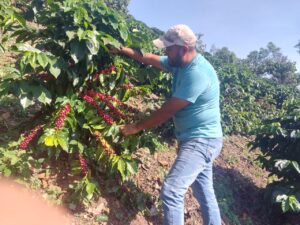Description
Adelina Escalante took charge of the farm 20 years ago when her husband had to migrate to the United States seeking a better life for his family due to the very low coffee prices. When her son, Alexis Velázquez Escalante, finished his university degree, he decided to support his mother with the farm work and start working on coffee processing and marketing.
Over the years, the maximum production on the 10 hectares was 110 quintals. The year rust (roya) struck, Alexis and his family were expecting a good harvest. This situation made them feel desperate, leading them to seek technical assistance from AMSA along with their manager. Engineer Lisandro recommended applying dolomitic lime and pruning.
They divided their plot into two parts and focused on one half (5 hectares). The following harvest, they managed to produce 70 quintals and, with the same technical assistance, began applying nutrients to the plants, in addition to renewing with the donation of seedlings from C.A.F.E. Practices. Initially, it was challenging because there were 35-year-old plants. Implementing the new management system required replacing these plants with new ones. Over time, the first hectare showed a favorable change, encouraging the family to continue renewing the entire plot.
Two years after the rust incident, the coffee producers were very excited as they harvested 150 quintals. The plantations they sowed after the rust were very productive, increasing production to 230 quintals on the same 10 hectares where they previously harvested 110 quintals. During this period, the family observed that the Marsellesa variety, which came from the donations, had very favorable results and increased productivity to 370 quintals in the 2018-2019 harvest. In the previous 2019-2020 harvest, they managed to obtain 430 quintals. This almost 400% increase was achieved while maintaining the strict high-quality standard of the coffee in Peña Blanca at 1550 meters above sea level.
Currently, they have renovated 90% of their plot with varieties Costa Rica (15%), Marsellesa (35%), Guacamaya (5%), Arabica and Bourbon (20%), Caturra (10%), and Sarchimor (5%). Regarding the microlots, 85% are currently Marsellesa.
Over the years, the family has focused on the infrastructure of their farm, which consists of the main house, workers' house, and wet mill. By perfecting their plantations, they have become interested in improving the wet milling process to enhance coffee quality. Their mill includes 1 two-disk pulper to speed up the depulping process, 4 fermentation tanks, and 1 well for fermenting water. Their goal is to produce 700 quintals on these 10 hectares without neglecting the quality of their process to ensure high-quality coffee.
Currently, they balance their career and have a commitment to their own plot, giving back a little of what it has given them, as it has been a family heritage and tradition. The family mentions that they have experimented with new anaerobic fermentation processes and greenhouse drying to achieve a better cup score, deviating slightly from the traditional washed processes.
Farm Information
-
Farm NamePeña Blanca
-
FarmerAdelina Escalante Flores
-
Altitude1300-1500
Score
-
Score89.03
Lot Information
-
Year2024
-
Processing SystemWashed
-
VarietyMarsellesa




